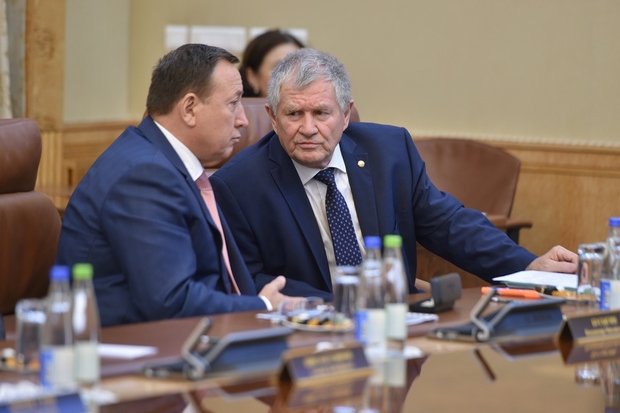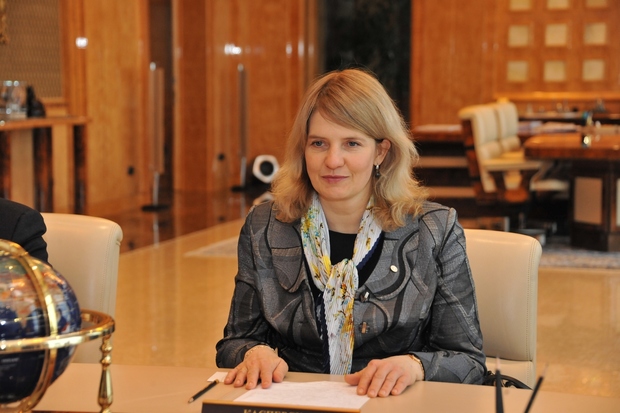Rustam Minnikahnov: ‘We should consider what price will be in the next 25-30 years for gas and other raw materials’
At the meeting of Tatneftekhiminvest-holding JSC, the Tatarstan President Rustam Minnikhanov has put forward a 'gas alternative' — can natural gas become a raw material replacement for hydrocarbon fractions for olefins production and its subsequent conversion? It seems that on the threshold of the construction of the major olefins complex at 500 billion rubles, all sorts of raw sources are being considered so as not to be vulnerable to oil shocks. However, the defence of the Russian technology for production of olefins from natural gas, proposed by the Siberian Institute named after Topichev of the Russian Academy of Sciences, ended with the ambiguous opinions of the oilmen.
The meeting of Tatneftekhiminvest-holding JSC, held on 26 August, was attended by the chief executives of the Tatarstan petrochemical industry – Director General of TAIF Albert Shigabutdinov, his advisor on strategic issues Vladimir Busygin, Director General of Nizhnekamskneftehim Azat Bikmurzin and Director General of Tatneftekhiminvest-holding Rafinat Yarullin, who, as it turned out later, was one of the first ones who saw a pilot plant for producing olefins from gas – it is what can turn the Russian petrochemical industry. Now it develops according to the classical technology of pyrolysis of straight-run gasoline produced during the refining of oil, and therefore it is vulnerable to fluctuations in oil prices. The 'gas alternative' can fundamentally change the industry. In this sense, stated in the agenda of the meeting theme – 'the technology for producing olefins from natural gas through oxygenates' — sounded revolutionary and excited the oilmen. With the assistance of Rustam Minnikhanov, they had to look at the new era of gas processing and understand whether the gas chemistry, to be more specific, its technology, can surpass the traditional petrochemical processing.
Olefins from gas
The Russian technology of producing olefins from natural gas was represented by the Deputy Director of the Institute of Petrochemical Synthesis named after Topchiev of RAS Anton Maksimov. He immediately made it clear that the traditional method of obtaining olefins through pyrolysis has reached its technological ceiling, so 'it is quite difficult to increase its potential'. He noted that the current decline in oil prices is good for the oilmen but today 'the world still focuses on the processing of other types of hydrocarbon crude – natural gas or coal.'
So, his Institute has developed the technology of producing olefins through a dimethyl ether (DME), which gives the possibility to obtain one tonne of olefins from 2,5 — 2,8 thousand cubic meters of gas, i.e. in the shortest way. 'The process for obtaining olefins from natural gas involves at the first stage the synthesis gas, and then there are two ways: the first — obtaining of DME directly from synthesis gas, the second — of dimethyl ether,' he explained. According to him, gas and oil technologies are quite young — 10 years ago, they were only on paper and now have been successfully implemented abroad. The gas chemistry is especially popular in China. According to Maksimov, now almost four million tonnes of olefins are produced from DME, which capacity has reached 13 million tonnes. 'Our technology eliminates the intermediate process of the synthesis gas of the methanol and directs it immediately to produce dimethyl ether, and from it to produce ethylene, propylene and butylene with a high conversion rate,' he assured. The oilmen listened to him in silence, without asking questions.
In conclusion, Maksimov offered to establish at one of the refineries of the Republic a pilot demonstration plant for producing ethylene/propylene with a capacity of a tonne per day on the basis of synthesis-gas for hydrogen production, as well as to build on the basis of Kazanorgsintez the top industrial plant with a capacity of 1 million tonnes per year of ethylene and propylene. In other words, to create two industrial productions for assessment of their effectiveness. At the same time, the production of 1 million tonnes of olefins requires gas at 2.8 billion rubles.
As the advantages of the technology, he highlighted the fact that the technology gives the possibility to change the ratio of products, as well as it can isolate only DME that can be an analogy of liquefied natural gas. For example, in China it is used as a fuel for diesel generators.
The basket of output products from naphtha is better
Frankly speaking, the oilmen had ambiguous attitude to the ideas of the gas chemistry and exchanged with their thoughts with Rustam Minnikhanov. According to Vladimir Busygin, this technology was considered by oilmen but they 'decided on the technology of obtaining from nafta' because the basket of output products is better than from DME. According to him, from dimethyl ether it is possible to obtain propylene and ethylene, and from naphtha in addition to this are produced other products. 'Of course, it is necessary to consider the project in more detail together with the Institution,' he said.
After that, Anton Maksimov said that in Russia a pilot plant already operates, it produces gas from 40 to 50 kg of olefins per day.
'How do you think, if we use natural gas, naphtha and ethane – then in what proportions? Have you done calculations?' inquired Rustam Minnikhanov.

'I have seen this plant, that is why we once again invited the experts of the Institute named afetr Topichev to look in details,' joined the conversation the Director General Rafinat Yarullin. According to him, this technology is certainly more interesting for Gazprom because a huge amount of gas is not currently used and it is possible to obtain DME and to process.
Having heard the conflicting opinions of the oilmen, the President stated that the future still belongs to the gas chemistry. 'Our country is gas one and it is necessary to develop the gas industry. This technology will be in demand. Let's discuss, Albert Kashafovich,' he addressed to the head of TAIF group. 'Of course, we should assess the economy, what price will be for the next 25 — 30 years for gas and other raw materials,' warned the President. 'If we start the gas processing, it is necessary to have contracts for 20-25 years with a clear formula.'
Ecobiopreparat will start research works in Sabinsky district
Earlier, the President approved the implementation of the interregional project in Biomedicine Ecobiopreparat for the production of ten antiviral immunoglobulin and albumen biopharmaceutical of the new generation. That is, they are not made not of donated blood but using blood from the slaughter of livestock. The project has received the Republican support at the amount of 83 million rubles and also invested its own money at 38 million rubles. As Leonty Polishchyuk told Realnoe Vremya, originally this enterprise operated in Izhevsk but because of the ban on doing pharmaceutical work in the city centre it was forced to find a new place of residence. NPO Ecobiopreparat plant PLC has managed to restart the production in Tatarstan, Sabinsky district, where there was created a laboratory unit for carrying out scientific and research works and organized a pilot production with a view of 10 thousand units. Now NPO Ecobiopreparat organized a collection of source raw materials in Tatarstan.
Natalia Kasperskaya: 'There are no ready solutions on IT security in the world'
A noticeable excitement of the audience was caused by the report of Director General of InfoWatch Group of companies Natalia Kasperskaya, who became one of the residents of Innopolis and even had time to apply for the certification according to the canons of Halal the IT-product. She warned about the growth of cyber attacks in Russia – the automated enterprise management systems and confidentiality of sensitive information are under increasing threat. But if the damage from information leakage is difficult to calculate in rubles – last year there were two to five incidents, then the banks' losses from new types of phishing attacks are more than impressive.

The latest form of informational attacks with the spread of social networking appeared… According to Natalia Kasperskaya, last year there was the stuffing information that the license of the bank was going to be revoked, after that there was an outflow of funds. The bank does not disclose the damage amount, but it was quickly redeemed by means of PR and technical capabilities. 'You can't solve this problem automatically because many people quickly pass the information to friends. Two years ago Sberbank suffered from a similar attack – the investors withdrew 600 million rubles in five days, so they needed help of the Central Bank,' she said… The Minister of Informatization and Communication Roman Shaikhutdinov added that the attack was committed on the information resources of the authorities. 'This topic bothers us all,' said the presiding President of Tatarstan Rustam Minnikhanov. 'The work in this direction should be systematic. Many things we can do in the Republic.' He recommended to arrange a seminar for corporate IT directors and to audit companies on their security.